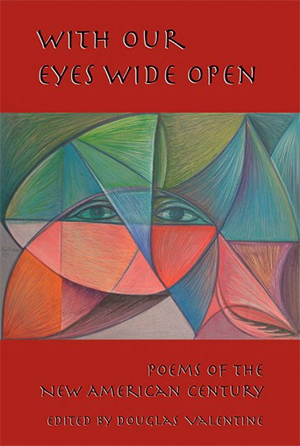
With Our Eyes Wide Open: Poems of the New American Century, edited by Douglas Valentine, is just out from Albuquerque’s own West End Press. This handsome volume should be on the bookshelf of every poetry lover and everyone concerned with our global struggles, how the US is perceived throughout the world, and how conscious poets here are setting the record straight. Rather than keep the book on your bookshelf, enter it often. You will find plenty to make you whole.
Before you even open the book, you will be struck by its inviting design (by Bryce Milligan of Wings Press in San Antonio, Texas) and by René H. Arceo’s striking image “Nostalgia” (colored pencil on paper, 1993). This strong image sets the tone, and nostalgia is only a small part of that.
In his editor’s note, Valentine tells us his “original idea was to gather together a collection of poems about America’s values and impact on the world. I wanted to hear what poets in other nations thought about America, its relentless wars, and its self-proclaimed ‘exceptionalism,’” he writes. Anthologies, though, grow organically from the material submitted, and Valentine goes on to explain that although initially he had sought poems about the war on terror and America’s wars on Iraq and Afghanistan, his concept soon expanded “to include the plight of exiles, immigrants, outcasts, the poor, the homeless, the working classes, and victims of race and gender discrimination.” (p xi)
With Our Eyes Wide Open includes work by poets in Nicaragua, Uruguay, Lesotho, Australia, South Africa, Chechnya, Turkey, Greece, Poland, Serbia, Israel, Canada, Italy, Iraq, France, Russia, Afghanistan, India, Jamaica, Ireland, Vietnam, Chile, Guatemala, Oman, Morocco and the United States. Some great contemporary voices alternate with new discoveries. This is not the stuff we are fed in our corporate press or mainstream publications. This is a poetry of conviction, passion, and revelation.
I believe I could woo the reader with any one of the poems gracing close to 200 pages. But Albuquerque’s current crisis of police brutality, aimed at a population fed up with more than two dozen irrational killings over the past several years, seems to call for the following poem by Uruguayan Eduardo Galeano:
The Nobodies
Fleas dream of buying themselves a dog, and nobodies
dream of escaping poverty: that one magical day good luck will
suddenly rain down on them—will rain down in buckets. But
good luck doesn’t rain down yesterday, today, tomorrow, or ever.
Good luck doesn’t even fall in a fine drizzle, no matter how hard
the nobodies summon it, even if their left hand is tickling, or if
they begin the new day with their right food, or start the new
year with a change of brooms.
The nobodies: nobody’s children, owners of nothing.
The nobodies: the no ones, the nobodied, running like rabbits,
dying through life, screwed every which way.
Who are not, but could be.
Who don’t speak languages, but dialects.
Who don’t have religions, but superstitions.
Who don’t create art, but handicrafts.
Who don’t have culture, but folklore.
Who are not human beings, but human resources.
Who do not have faces, but arms.
Who do not have names, but numbers.
Who do not appear in the history of the world, but in the
police blotter of the local paper.
The nobodies, who are not worth the bullet that
kills them.
(Translated from the Spanish by Cedric Belfrage, p 5)
Anyone recognize James Boyd? Or any of the other “nobodies" considered dispensable by trigger-happy members of Albuquerque’s police force over the past several years? This is only one poem among a very rich offering.
Poems like those in With Our Eyes Wide Open are important, first of all because they constitute quality literature, and secondly because they tell us and others who we are—despite the ways in which we are crassly or subtly misrepresented by the power structure. West End Press, with more than 100 titles to its credit, has been giving us work like this for years. Support independent publishing by buying its books. I think you’ll be glad you did.



Responses to “Poetry That Tells Us Who We Are”